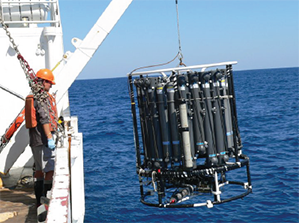
Researcers deploy a water sampling device to measure conductivity, temperature and depth (CTD) at different points of the water column. Photo credit: Alan Shiller USM
Since the explosion of the Deepwater Horizon oil rig, scientists from a variety of backgrounds have been hard at work collecting samples to monitor the effects of the oil on marine environments. Dr. Alan Shiller, a chemical oceanographer from the University of Southern Mississippi (USM), has been studying both direct and indirect chemical effects from the spill. Direct effects include the spread of crude oil and the physical and chemical changes of the oil over time while indirect effects pertain to changes in natural ocean processes. This includes the prevention of exchange of oxygen at the surface of the water because of the presence of an oil slick. His observations provide other oil spill researchers with valuable information in seeking to understand ecosystem effects of the oil spill.
Classroom Activity: Oil-Munching Microbes
Oil, from natural seeps in the ocean floor, continuously flows into the environment. Some microbes, including bacteria, are specially adapted to survive exposure to hydrocarbons and are even able to use it as food. In this lesson, students will learn about natural oil seeps, the Gulf of Mexico oil spill, and how microbes are helping clean up our environment. An experiment may be added to this lesson so students can observe and evaluate the effectiveness of oil-eating microbes.
Chemical Effects of the Oil Spill Mississippi Sound – PDF 866KB
